Sherbet was one of the most prominent and successful Australian rock bands of the 1970s. The 'classic line-up' of Daryl Braithwaite on vocals, Tony Mitchell on bass guitar, Garth Porter on keyboards, Alan Sandow on drums, and Clive Shakespeare on guitar provided their teen-oriented pop style. In 1976 Shakespeare left and was soon replaced by Harvey James. Sherbet's biggest singles were "Summer Love" (1975) and "Howzat" (1976), both reaching number one in Australia. "Howzat" was also a top 5 hit in the United Kingdom. The band was less successful in the United States, where "Howzat" peaked at No. 61. As The Sherbs they also reached No. 61 in 1981 with "I Have the Skill". The group disbanded in 1984. Subsequent re-unions have occurred since 1998.
Garth Ivan Richard Porter is a New Zealand-born Australian multi-instrumental musician, songwriter and record producer. He was a member, on keyboards and backing vocals, of the pop group, Sherbet (1970–84), and co-wrote both of their number-one singles, "Summer Love" and "Howzat". Porter is a co-writer and producer for country music singer Lee Kernaghan.

Sherbet's Greatest Hits (1970–1975) was a compilation album released on Infinity Records in Australia in 1975, at the height of Sherbet's popularity in Australia. It spent 1 week at the top of the Australian album chart in 1975. It was Sherbet's first number one album in Australia and covered their single releases 1970–1975. The liner notes gave track-to-track information.
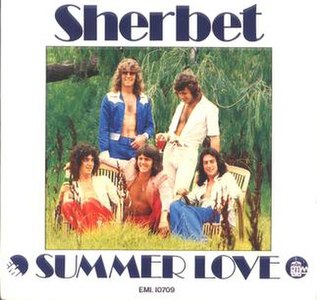
"Summer Love" is a song by Australian pop group Sherbet which was released on 20 March 1975. It became their first number-one hit on the Australian Kent Music Report Singles Chart. The band had had a string of top 40 hits in the early 1970s with "Can You Feel It Baby" in 1971. "Summer Love" spent 2 weeks at number one in May 1975. The song was written by band members, Garth Porter and Clive Shakespeare. It was promoted on the newly aired ABC TV pop series, Countdown, which gave it wide exposure. From early 1975 the group made more appearances on the show than any other band in the programme's history. In October, at the King of Pop Awards, "Summer Love" won the Most Popular Australian Single, the band won Most Popular Australian Group and their lead singer, Daryl Braithwaite, won the King of Pop award.

Time Change... A Natural Progression is the debut studio album by Sherbet released in 1972. The album includes the bands hit singles "Can You Feel It, Baby?", "Free the People", "You're All Woman" and "You've Got the Gun". The album peaked at number 66 on the Kent Music Report.
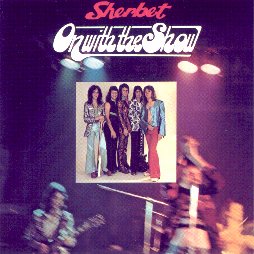
On with the Show is an album by Sherbet released in 1973. The album spent 12 weeks in the Australian charts, reaching a highest point of #6. "Cassandra" was the only single to be released.

Slipstream is an album by Sherbet released in 1974. On the Kent Music Report, it peaked at No. 3. Singles from the album include "So Glad You're Mine", "Slipstream" and "Silvery Moon".
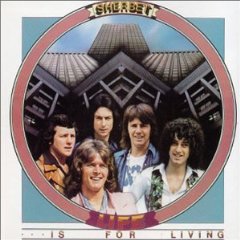
Life... Is For Living is an album by Sherbet released in 1975. It spawn two singles Life and Only One You. The album reached at number 3 on the Kent Music Report.

Photoplay or Magazine is the sixth studio album by Australian rock band Sherbet released in 1977. The album spawn two singles Magazine Madonna and High Rollin'. The album charted at number 4 on the Kent Music Report. In 1999 the album was remastered to CD.
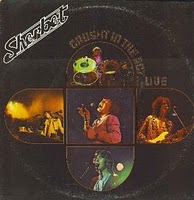
Caught in the Act... Live is the second live album by Australian band Sherbet released in 1977. The album peaked at number 33 on the Kent Music Report.

Sherbet or Highway 1 is the seventh studio album by Sherbet released in 1978. The album peaked at number 6 on the Kent Music Report. The album spawn three singles Slipping Away, Another Night on the Road and Beg Steal or Borrow.

Track Record is a third compilation album by Australian rock band Sherbet released in 1979.

The Sherbet Phenomenon is the fourth compilation album by Australian rock band Sherbet released in 1980.

In Concert is a live album by Sherbet, released in 1975. It reached number 11 on the Kent Music Report in Australia. To promote the album, "Freedom" was released as a single.
"So Glad You're Mine" is the eighth single by Australian band Sherbet, released in 1974. The song was written by Sherbet members Garth Porter and Clive Shakespeare.
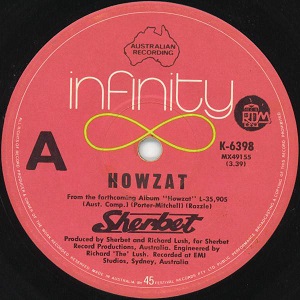
"Howzat" is a song by Australian band Sherbet, released in 1976. The song reached number 1 in Australia on the Kent Music Report and it also reached number 1 in New Zealand on the Recorded Music NZ. It was released from Sherbet's album of the same name, Howzat. The song was written by band members Garth Porter and Tony Mitchell. The title track was also a number one hit and remains the group's biggest hit, especially outside of Australia, reaching the top 4 of the UK charts and also entering the US Billboard Hot 100 chart.
"Cassandra" is the seventh single by Australian band Sherbet, released in 1973. It is the first and final single to be released from Sherbet's second studio album, On with the Show. The song was written by Sherbet members Garth Porter and Clive Shakespeare. Cassandra peaked at number 5 on Go-Set and it also peaked at number 9 on the Kent Music Report.
Slipstream is the ninth single by Australian band Sherbet, released in 1974. It was released as the second single from Sherbet's album Slipstream and it reached number 5 on the Kent Music Report and number 7 on Go-Set. The song was written by Garth Porter and Clive Shakespeare.
Silvery Moon is the tenth single by Australian rock band Sherbet, released in 1974. It was released as the third and final single from the album Slipstream and it was written by Garth Porter and Clive Shakespeare. The song reached number 5 on the Kent Music Report
Freedom is the twelfth single by Australian rock band Sherbet, released in 1975. It was released as the first and final single from the album In Concert and it was written by Garth Porter and Clive Shakespeare. The song reached number 52 on the Kent Music Report.













